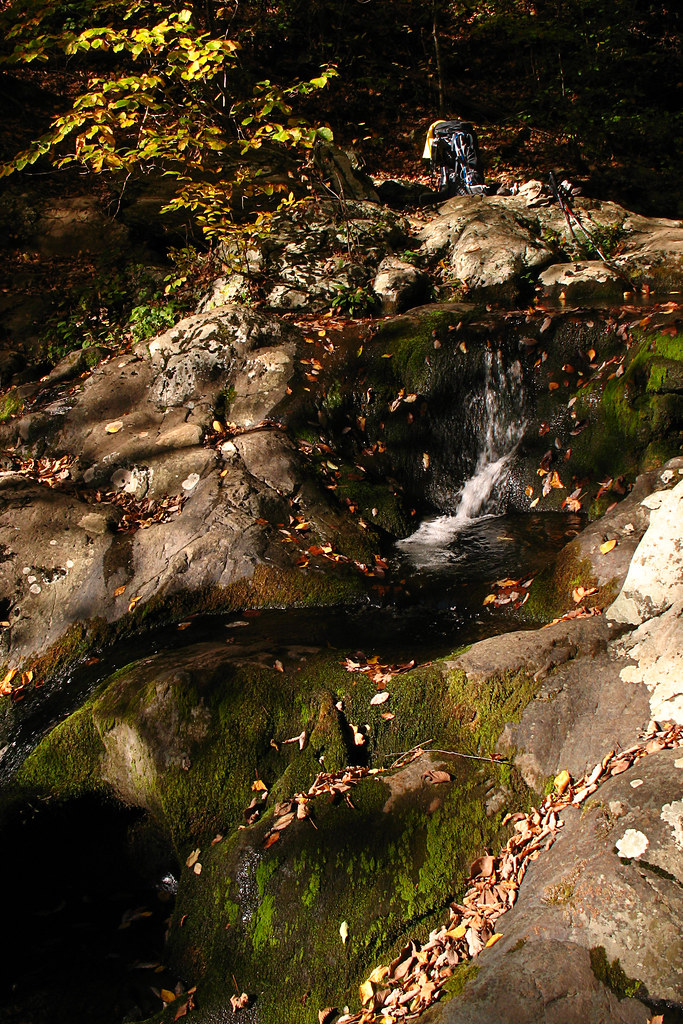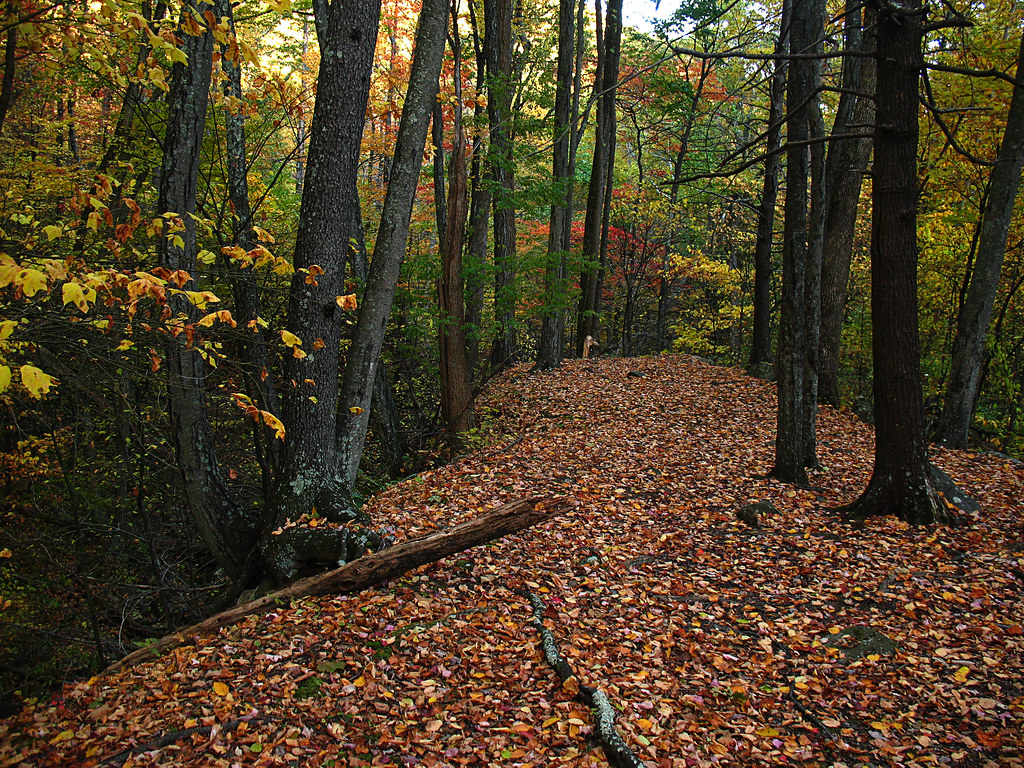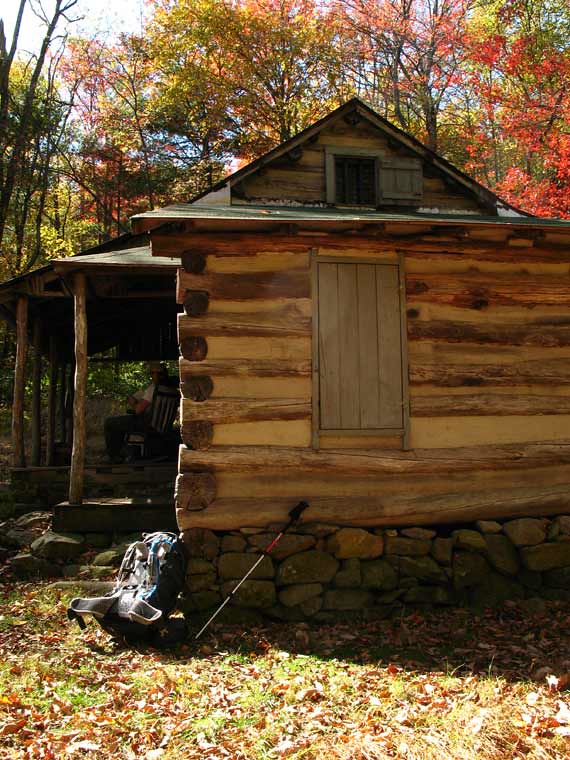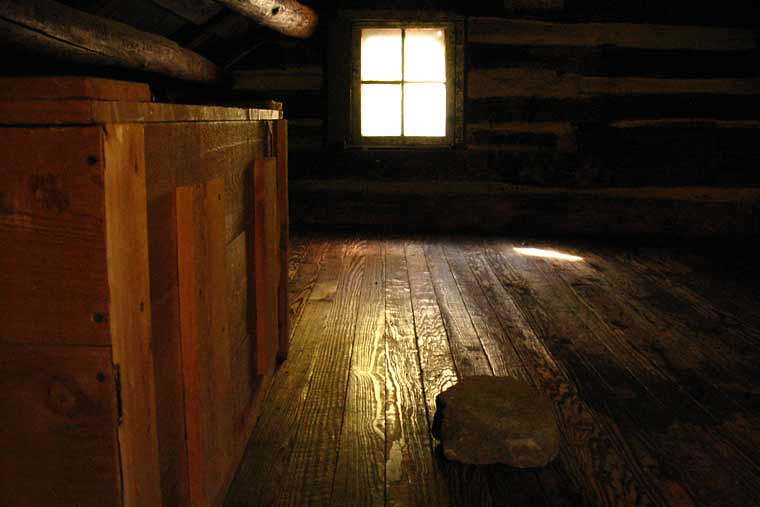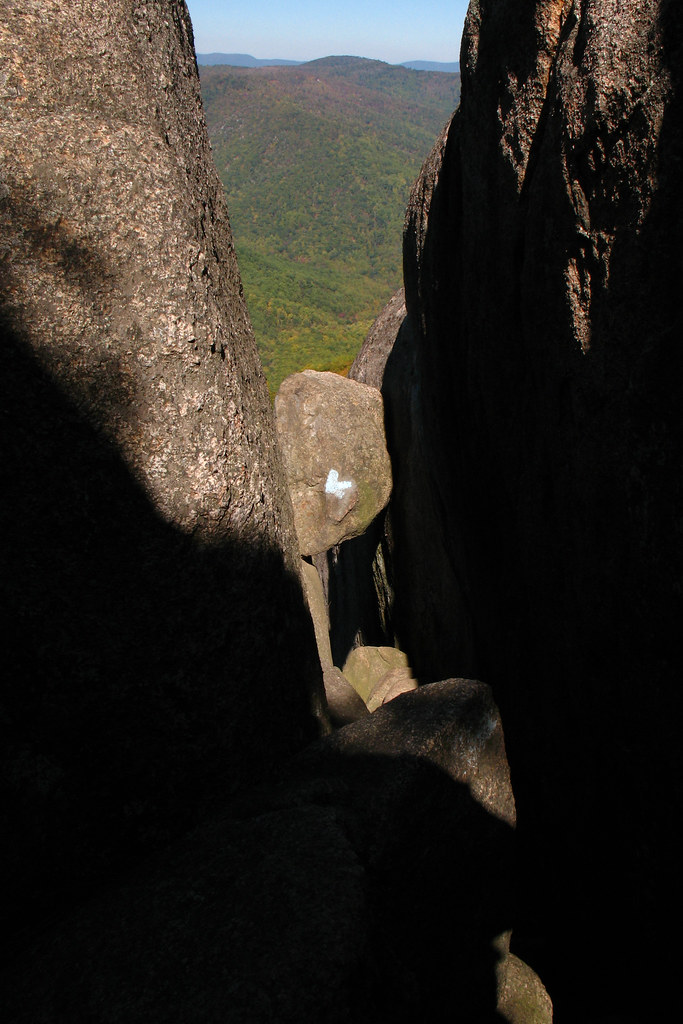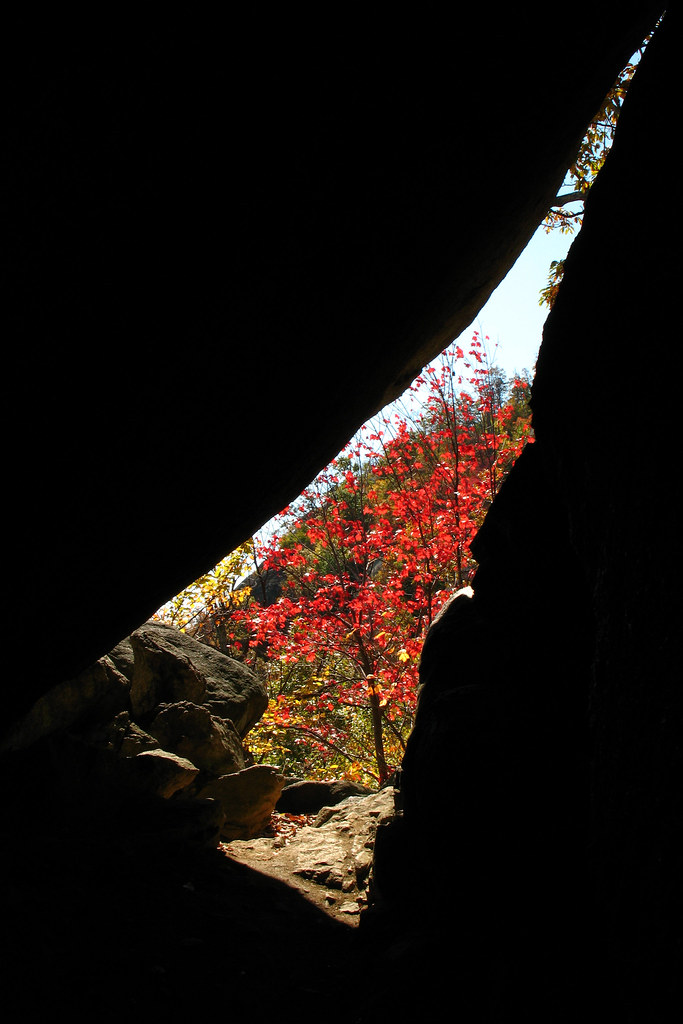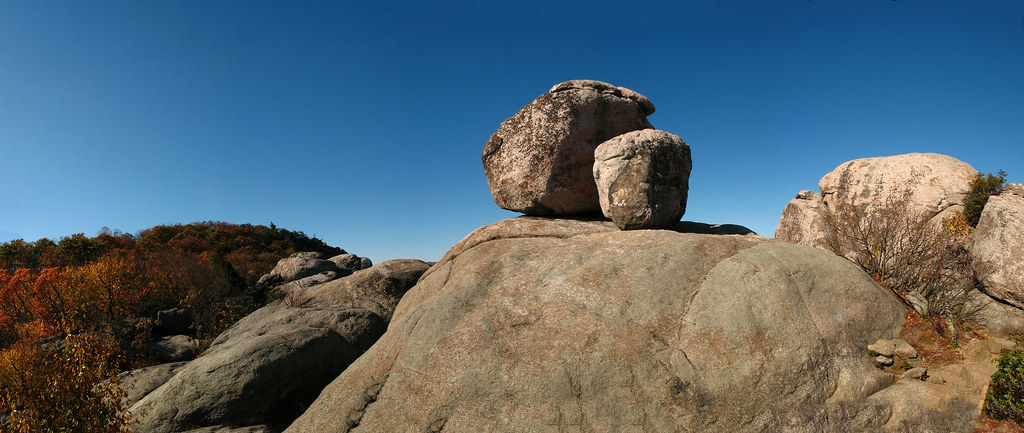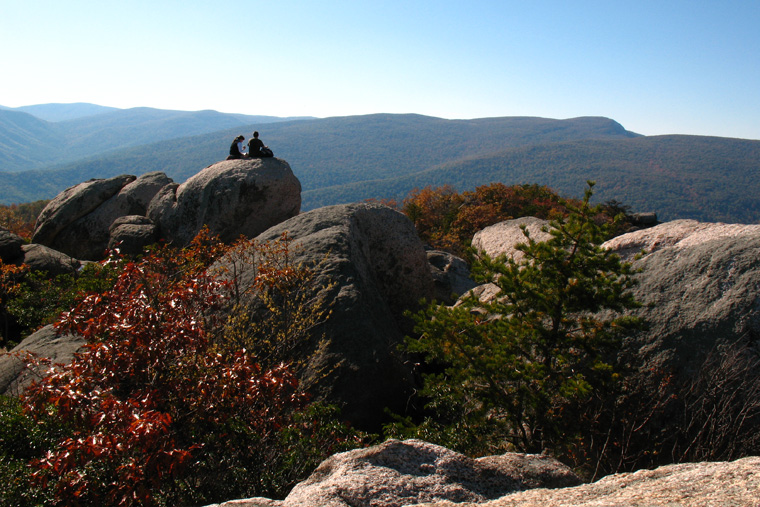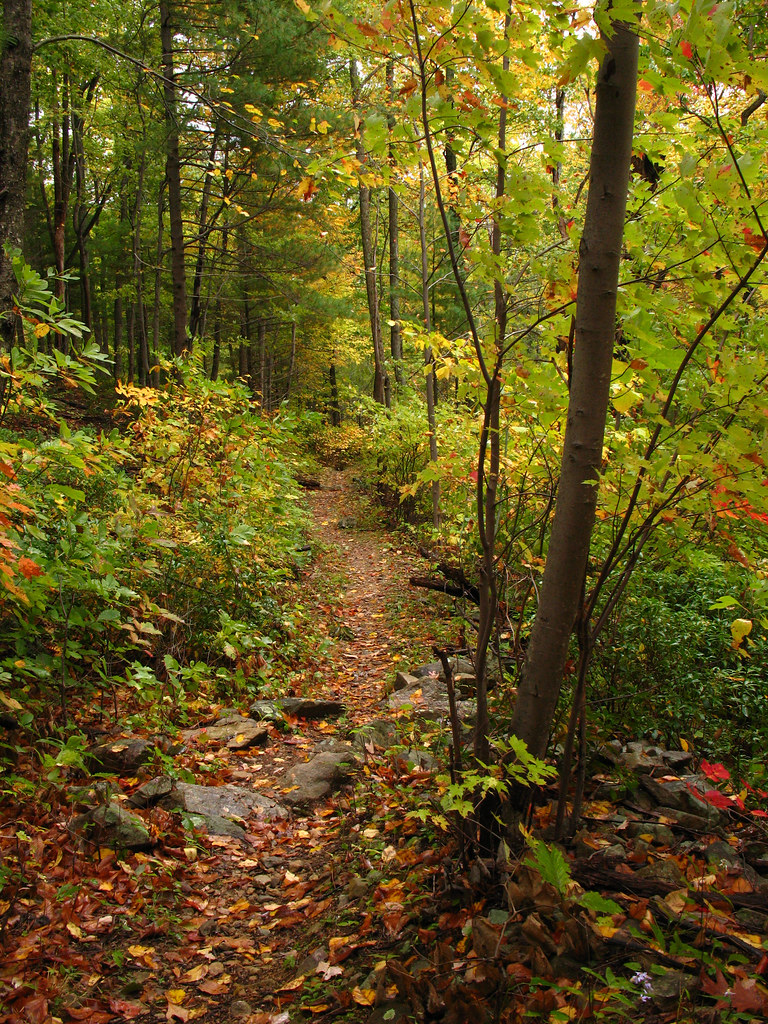“Language has created the word loneliness to express the pain of
being alone. And it has created the word solitude to express the
glory of being alone.” - Paul Tillich
Yesterday, after leaving Corbin Cabin, the temperature began to feel more like summer. I have experienced a year of seasons in five days. After looking around to make sure I was alone, I changed into warm weather clothes.
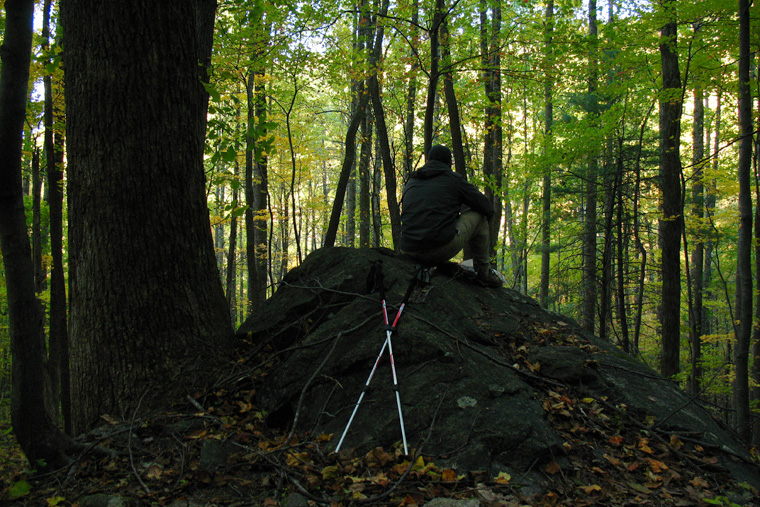 Wednesday morning, I looked over my map and ate breakfast on a car-sized stone jutting out of the ground at the top of a hill. Even in late-October, the trees that covered the ground, sloping down hill forty feet below, still clung to their brilliantly green leaves.
Wednesday morning, I looked over my map and ate breakfast on a car-sized stone jutting out of the ground at the top of a hill. Even in late-October, the trees that covered the ground, sloping down hill forty feet below, still clung to their brilliantly green leaves.
I started the day hiking out of Whiteoak Canyon and onto Cedar Run Trail, which curled through the forest up hilltops, passed yellow leaves flowing down streams that crashed into boulders. Waterfalls poured over polished rock and surged into clear pools, many large enough for a swim.
With the grim of showerless days, I desperately wanted to hop in. Some of these waterfall grottoes were just deep enough to sit down with water up to my chest, like natural hot tubs. The only problem, they were fifty-degree hot tubs. If the temperature was right, I would have had to add a day to my trip and would have had constantly pruned toes and fingertips.
 Fully rested, and my feet sun-dried, I slipped my shoes back on and returned to the trail, the connection to the earth broken again by rubber soles. Miles later, I turned onto the horse hoof tilled Skyland-Big Meadows Trail. The rumble of cars on Skyline Drive was now in earshot. To provide an unobstructed view for motorists, a large swath of trees had been removed, a manmade ecotone segregating two combating ecosystems. I was unhappy with this accommodation. It made me feel like the wild wilderness didn't exist as it once did.
Fully rested, and my feet sun-dried, I slipped my shoes back on and returned to the trail, the connection to the earth broken again by rubber soles. Miles later, I turned onto the horse hoof tilled Skyland-Big Meadows Trail. The rumble of cars on Skyline Drive was now in earshot. To provide an unobstructed view for motorists, a large swath of trees had been removed, a manmade ecotone segregating two combating ecosystems. I was unhappy with this accommodation. It made me feel like the wild wilderness didn't exist as it once did.
At the turnout on the other side of the divide, a woman got out of the car’s passenger door and sat down on a guardrail, her back to the view. Her husband stepped out of the driver’s side to get a picture. They hopped back in and drove off. The windshield experience is almost no experience at all. Another casualty of a comfortable life, not knowing how much more majestic such a view is when it caps the end of a day-long hike.
 I turned my gaze up and saw that I was being stared at by the glossy black eyes of a white-tailed deer. We both stood unmoving, locked in a staring contest. Our actions mirrored, but I assume our thoughts did not. Unless she was thinking, “Ooh, a human. Don’t move too suddenly, you’ll scare it. I can’t get tired of seeing these on the trail, so majestic! Where's my camera?” but she probably wasn't. She gave her tail a rattle and continued grazing.
I turned my gaze up and saw that I was being stared at by the glossy black eyes of a white-tailed deer. We both stood unmoving, locked in a staring contest. Our actions mirrored, but I assume our thoughts did not. Unless she was thinking, “Ooh, a human. Don’t move too suddenly, you’ll scare it. I can’t get tired of seeing these on the trail, so majestic! Where's my camera?” but she probably wasn't. She gave her tail a rattle and continued grazing.
being alone. And it has created the word solitude to express the
glory of being alone.” - Paul Tillich
Yesterday, after leaving Corbin Cabin, the temperature began to feel more like summer. I have experienced a year of seasons in five days. After looking around to make sure I was alone, I changed into warm weather clothes.
When the trail intersected a fire road, I stopped to check my location. I slid my pack onto the ground, sat next to it with my map, and leaned my back against a trail signpost. For no immediately apparent reason, I was overcome with a deep feeling of happiness. I rested the back of my head on the post with a peaceful grin on my face.
It wasn’t a unique or exceptional spot in any way, just an ordinary forest floor covered in dried leaves. There was no jaw-dropping view, or extraordinary sight or sound, but for whatever reason, I felt like I did that first time I got behind the wheel and pulled out of the driveway alone for the first time. I felt free.
I’m sure many things contributed to the sentiment: not knowing what would be around the next bend, a backpack full of everything I needed and nothing more, nothing distracting my thoughts, and not needing to be anywhere, do anything, or answer to anyone. Solo backpacking doesn’t even give you the option to have it any other way. It’s incredibly liberating.
It helps that I love being alone. “I never found the companion that was so companionable as solitude.” I remember reading those words when I was 24 in my tattered copy of Walden by Hendry David Thoreau. It struck a chord with me. Suddenly it was ok to love being alone, without wondering if it was a social disorder. Not that that stops others from wondering.
I finished Tuesdays's hike meandering through the oldest trees in Shenandoah, then into Whiteoak Canyon, the most spectacular waterfall hike in the park. Just before sunset, I found a place to camp for the night.
 Wednesday morning, I looked over my map and ate breakfast on a car-sized stone jutting out of the ground at the top of a hill. Even in late-October, the trees that covered the ground, sloping down hill forty feet below, still clung to their brilliantly green leaves.
Wednesday morning, I looked over my map and ate breakfast on a car-sized stone jutting out of the ground at the top of a hill. Even in late-October, the trees that covered the ground, sloping down hill forty feet below, still clung to their brilliantly green leaves.I started the day hiking out of Whiteoak Canyon and onto Cedar Run Trail, which curled through the forest up hilltops, passed yellow leaves flowing down streams that crashed into boulders. Waterfalls poured over polished rock and surged into clear pools, many large enough for a swim.
With the grim of showerless days, I desperately wanted to hop in. Some of these waterfall grottoes were just deep enough to sit down with water up to my chest, like natural hot tubs. The only problem, they were fifty-degree hot tubs. If the temperature was right, I would have had to add a day to my trip and would have had constantly pruned toes and fingertips.
The trail became steep and exhausting, so I stopped to rest at a small waterfall spilling into a pond shaded by trees. The water cascaded from there through narrow channels, tumbling into puddles of varying sizes, until finally plummeting into one of the hot tub pools fifty feet below.
Surrounded by the shushing of flowing water, I sat by a deep puddle and took off my shoes and socks. I dipped my head into the puddle’s ice-cold water and then sat on the edge with my feet in.
I realized I loved being barefoot. I hadn’t really given it much thought before. It may be something insignificant and ordinarily taken for granted, but I grew up with shoes on from morning until night. In fact, my only memory of being barefoot outdoors, when I was growing up in the eighties, was when my friends would run down our gravel driveway without shoes, while I pointlessly tried to keep up with unhurried cautious steps like Brook Shields walking over glass in Circus of the Stars. (It's surprising how many eighties references I can fit into this journal.)
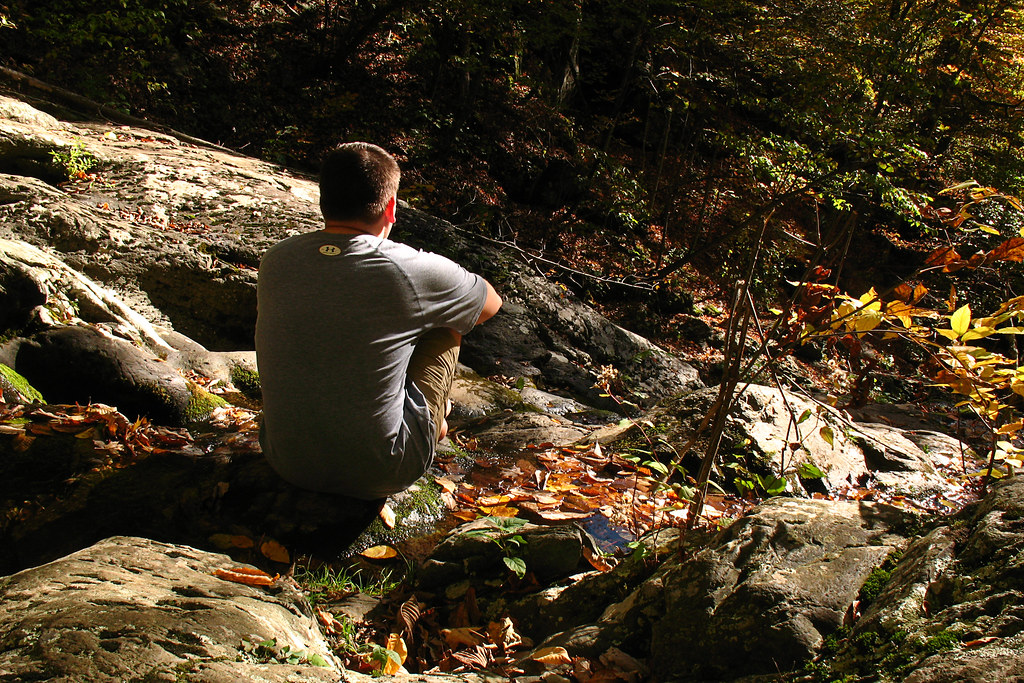 So, rarely allowing myself to be barefoot outdoors, this is kind of new to me. Now it seemed like strapping rubber soles to my feet just anesthetizes my brain from a fundamental human sensation. Imagine wearing gloves everywhere you went, what experiences would you miss? It seemed the equivalent to kissing someone while wearing a Halloween mask, pulling it off, and realizing, “Wow, this is much better,” that millimeter thin mask might as well have been miles thick.
So, rarely allowing myself to be barefoot outdoors, this is kind of new to me. Now it seemed like strapping rubber soles to my feet just anesthetizes my brain from a fundamental human sensation. Imagine wearing gloves everywhere you went, what experiences would you miss? It seemed the equivalent to kissing someone while wearing a Halloween mask, pulling it off, and realizing, “Wow, this is much better,” that millimeter thin mask might as well have been miles thick.
Surrounded by the shushing of flowing water, I sat by a deep puddle and took off my shoes and socks. I dipped my head into the puddle’s ice-cold water and then sat on the edge with my feet in.
I realized I loved being barefoot. I hadn’t really given it much thought before. It may be something insignificant and ordinarily taken for granted, but I grew up with shoes on from morning until night. In fact, my only memory of being barefoot outdoors, when I was growing up in the eighties, was when my friends would run down our gravel driveway without shoes, while I pointlessly tried to keep up with unhurried cautious steps like Brook Shields walking over glass in Circus of the Stars. (It's surprising how many eighties references I can fit into this journal.)
 So, rarely allowing myself to be barefoot outdoors, this is kind of new to me. Now it seemed like strapping rubber soles to my feet just anesthetizes my brain from a fundamental human sensation. Imagine wearing gloves everywhere you went, what experiences would you miss? It seemed the equivalent to kissing someone while wearing a Halloween mask, pulling it off, and realizing, “Wow, this is much better,” that millimeter thin mask might as well have been miles thick.
So, rarely allowing myself to be barefoot outdoors, this is kind of new to me. Now it seemed like strapping rubber soles to my feet just anesthetizes my brain from a fundamental human sensation. Imagine wearing gloves everywhere you went, what experiences would you miss? It seemed the equivalent to kissing someone while wearing a Halloween mask, pulling it off, and realizing, “Wow, this is much better,” that millimeter thin mask might as well have been miles thick.
I discovered that I want to feel the warmth of sun-drenched bedrock on the arches of my feet, dig my toes into fresh mud, feel dry leaves and thin twigs crunch under my weight. I want to curl my toes over the edge of a granite pool, plunge my feet into the shallow water, and watch the cloud of silky sediment roll out from underneath.
Backpacking has shown me that in my effort to make life comfortable, there have been casualties that just made life duller. Being barefoot outside is only one of them. Some of my favorite things on earth I sacrifice daily: the complete absence of unnatural noise, the excitement of wildlife confrontations, the lack of walls silencing nocturnal sounds, and being far from the city lights overwhelming the starlight. My solo hikes in such beautiful places keep me from forgetting. This contributes to the fact that I’m not the person today that I was last week or who I'll be next week. I need this escape like I need the right amount of sleep and clean air.
 Fully rested, and my feet sun-dried, I slipped my shoes back on and returned to the trail, the connection to the earth broken again by rubber soles. Miles later, I turned onto the horse hoof tilled Skyland-Big Meadows Trail. The rumble of cars on Skyline Drive was now in earshot. To provide an unobstructed view for motorists, a large swath of trees had been removed, a manmade ecotone segregating two combating ecosystems. I was unhappy with this accommodation. It made me feel like the wild wilderness didn't exist as it once did.
Fully rested, and my feet sun-dried, I slipped my shoes back on and returned to the trail, the connection to the earth broken again by rubber soles. Miles later, I turned onto the horse hoof tilled Skyland-Big Meadows Trail. The rumble of cars on Skyline Drive was now in earshot. To provide an unobstructed view for motorists, a large swath of trees had been removed, a manmade ecotone segregating two combating ecosystems. I was unhappy with this accommodation. It made me feel like the wild wilderness didn't exist as it once did.At the turnout on the other side of the divide, a woman got out of the car’s passenger door and sat down on a guardrail, her back to the view. Her husband stepped out of the driver’s side to get a picture. They hopped back in and drove off. The windshield experience is almost no experience at all. Another casualty of a comfortable life, not knowing how much more majestic such a view is when it caps the end of a day-long hike.
With the lack of shade from missing trees, the sun beat down on me with more intensity that it had all week. The sweat began to pour and I sipped my water quickly. I walked with my gaze pointed down. The first day the ground was soggy, the second snow covered, but now I kicked up dusty soil and crunched through dry autumn leaves with every step.
At this elevation, the trees had fewer leaves, which had mostly taken on their brown mid-autumn hues. The balder plants opened up the view deeper into the forest. The wildlife found sneakiness impossible. I could easily hear every one of them scurrying around on crunchy leaves, making even a sparrow sound large and significant.
 I turned my gaze up and saw that I was being stared at by the glossy black eyes of a white-tailed deer. We both stood unmoving, locked in a staring contest. Our actions mirrored, but I assume our thoughts did not. Unless she was thinking, “Ooh, a human. Don’t move too suddenly, you’ll scare it. I can’t get tired of seeing these on the trail, so majestic! Where's my camera?” but she probably wasn't. She gave her tail a rattle and continued grazing.
I turned my gaze up and saw that I was being stared at by the glossy black eyes of a white-tailed deer. We both stood unmoving, locked in a staring contest. Our actions mirrored, but I assume our thoughts did not. Unless she was thinking, “Ooh, a human. Don’t move too suddenly, you’ll scare it. I can’t get tired of seeing these on the trail, so majestic! Where's my camera?” but she probably wasn't. She gave her tail a rattle and continued grazing.
I still hadn’t eaten since breakfast ten miles back, but was only a couple of miles from Rose Falls, so decided to wait. It was worth it. Not only for the falls, but the declining elevation meant more color in the trees. I climbed down and sat on a rock near the base of the falls and decided I'd feast as much as I possibly could. A backpacking feast isn’t exactly Thanksgiving, as I ate less calories than I would normally eat on a lazy day at home: tuna salad in a half pita, cereal bar, crackers, and a couple handfuls of dried fruits and nuts.
I moved closer to the falls with my water filter and pumped water directly into my mouth. Again I wished the water were warmer so I could get in. I craved a shower. I looked at the falls and visualized moving under it with my head pointed up and eyes closed, feeling each drop splash on my face. I’ll never take warm showers for granted again.
On a sort of peninsula a short distance from the falls, I spotted a perfect place to call it a night. Two creeks converged to form a U thirty feet below, accompanying my hammock and I with the soothing murmurs of rippling water. Exhausted from a particularly grueling day, I setup camp, pulled my sleeping bag on like overalls, then laid down in the hammock without a struggle. I've come a long way since that first night.
Lying in my bed of nylon and rope suspended from the trees, I heard a large animal only a yard or two away. This time, it wasn’t a sparrow rustling through the dry leaves. It had heavy footsteps and a sniff that sounded big. With my headlamp on, I slowly poked my head out. The forest was pitch black, but a pair of reflective yellow eyes stared back at me.
 I fully expected to see a black bear, but to my relief, it was another deer. A relief since this is one of the few large animals you’ll encounter in the woods that will rarely generate headlines such as, “Hiker Mauled to Death by Soulful-Eyed White-Tailed Deer.”
I fully expected to see a black bear, but to my relief, it was another deer. A relief since this is one of the few large animals you’ll encounter in the woods that will rarely generate headlines such as, “Hiker Mauled to Death by Soulful-Eyed White-Tailed Deer.”
Lying in my bed of nylon and rope suspended from the trees, I heard a large animal only a yard or two away. This time, it wasn’t a sparrow rustling through the dry leaves. It had heavy footsteps and a sniff that sounded big. With my headlamp on, I slowly poked my head out. The forest was pitch black, but a pair of reflective yellow eyes stared back at me.
 I fully expected to see a black bear, but to my relief, it was another deer. A relief since this is one of the few large animals you’ll encounter in the woods that will rarely generate headlines such as, “Hiker Mauled to Death by Soulful-Eyed White-Tailed Deer.”
I fully expected to see a black bear, but to my relief, it was another deer. A relief since this is one of the few large animals you’ll encounter in the woods that will rarely generate headlines such as, “Hiker Mauled to Death by Soulful-Eyed White-Tailed Deer.”
It stared at me for a few seconds then lowered its head to continue grazing, unconcerned with the man with the glowing forehead, hanging from the trees.




